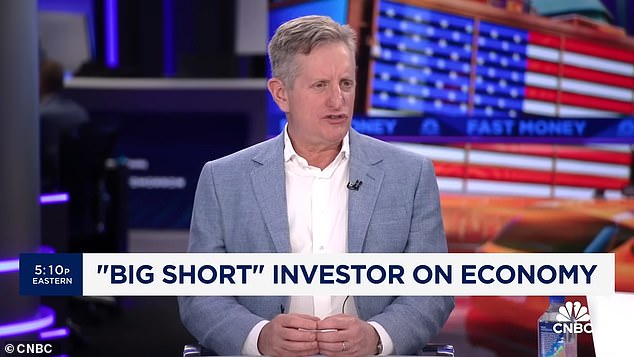The chatter around Wall Street has been hard to ignore lately, with some of the most prominent voices in finance issuing warnings about the state of the US economy.
From trade tensions to market volatility, investors are hearing a lot of cautionary tales.
Trade Wars and Recession Warnings
Steve Eisman, famous for his role in The Big Short, recently told the Daily Mail that a prolonged trade war with China could push the US into a full-blown recession.
“I don’t see a recession unless there is a trade war with China. If there is a trade war with China, all bets are off,” he said.
Meanwhile, financial journalist Andrew Ross Sorkin drew unsettling parallels to the 1929 stock market crash during an interview on CBS News’ 60 Minutes. “I just can’t tell you when, and I can’t tell you how deep,” he said.
“But I can assure you, unfortunately, we will have a crash.”
Adding to the alarm, JPMorgan CEO Jamie Dimon predicted that a recession could hit as early as 2026, citing weak job numbers and recent financial troubles in the auto lending sector.
In August, US employers added just 22,000 jobs, far below Wall Street expectations of 75,000.
Dimon’s Warnings Paint a Stark Picture
Dimon has been vocal about what he sees as early warning signs in the economy.
During a recent call with analysts, he said: “My antenna goes up when things like that happen.
I probably shouldn’t say this, but when you see one cockroach, there are probably more… Everyone should be forewarned on this.”
Such statements certainly cast a dramatic light on the economy, and having banking leaders sound the alarm can rattle investors.
The Reality of Market Forecasting
But here’s the truth for everyday investors: predicting recessions is notoriously unreliable.
While Dimon is widely respected for his executive skills, his record as a market forecaster, like others, is far from perfect.
Economists and analysts can be right sometimes, but even seasoned professionals often get the timing wrong.
Dimon has been warning about a recession for three years now.
If ordinary investors acted on that advice by pulling money out of stocks, they would have missed significant market gains.
Even during crashes, markets can rebound quickly, with the majority of returns often concentrated in just a few trading days.
Why Timing the Market Rarely Works
Trying to time the market is a risky strategy. Market swings are normal, and reacting to every headline can mean missing out on growth.
Even when stocks drop temporarily—like when President Trump threatened new tariffs on China—the market often stabilizes quickly.
Stocks fell on Friday but rebounded by Monday, and were back in positive territory by Wednesday.
Analysts generally expect that ongoing trade negotiations will result in moderate, reciprocal tariffs of 10 to 15 percent, even if a final deal takes years.
So far, fears about global tariffs have not materialized, and the US economy and consumers remain relatively resilient.
The US Economy Is Still Growing
Technically speaking, the US economy is far from a recession.
A broad definition of recession is two consecutive quarters of negative growth, yet the economy grew three percent in the second quarter of 2025—surpassing expectations.
Staying the Course Pays Off
Investing always carries risk, with ups and downs being part of the game.
But for long-term investors, staying invested often outweighs the dangers of trying to avoid market downturns.
Worrying constantly about a recession can mean missing opportunities for growth.
Staying the course, rather than chasing headlines, remains a proven strategy.
Share on Facebook «||» Share on Twitter «||» Share on Reddit «||» Share on LinkedIn
